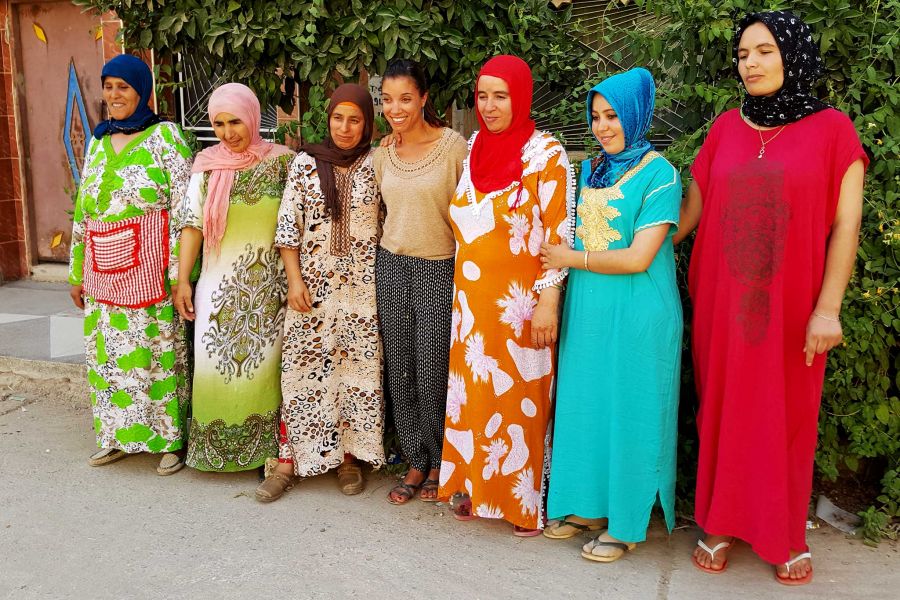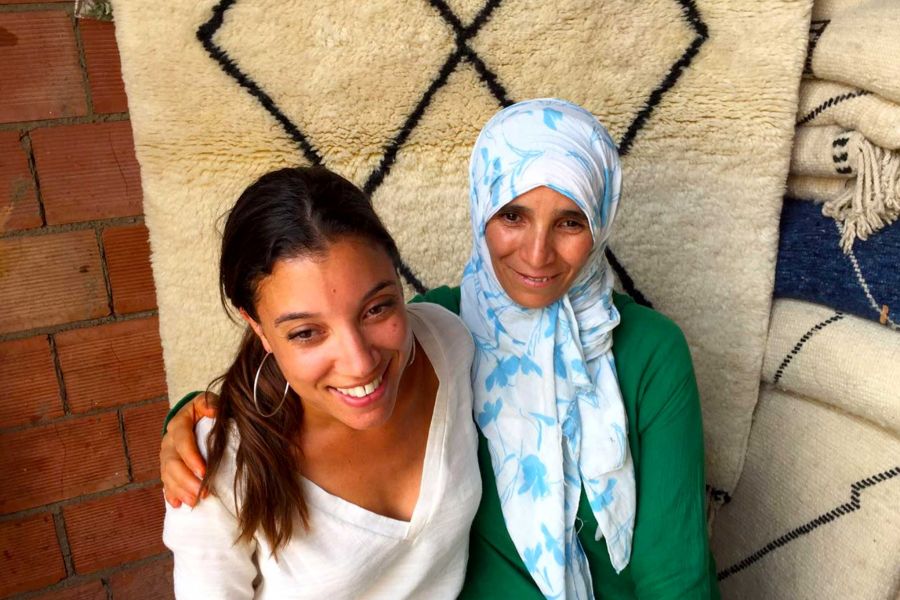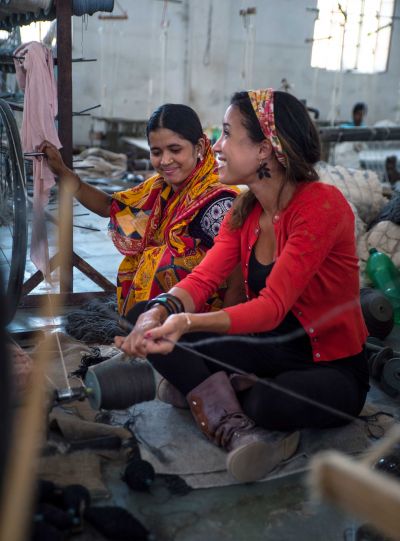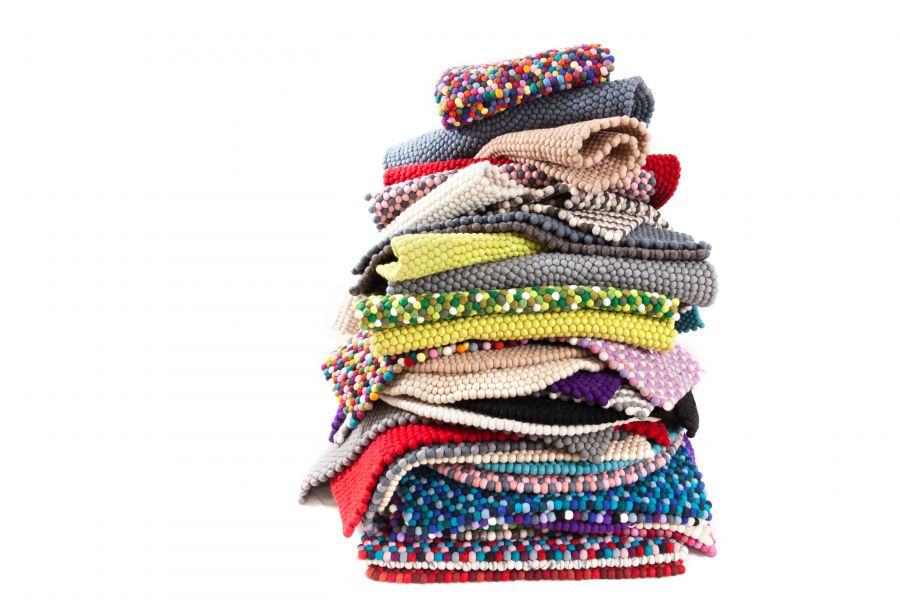
Workshop
Sukhi: weaving patterns of fraternity

Textile art, love of the world and respect for people and traditions: those are the ingredients of a very special project with roots in the Netherlands and Spain. We caught up with Nasia Burnet, the founder of Sukhi, a business that is helping improve the quality of life of entire communities in Asia and Africa while offering customers unique opportunities for dialogue and encounter.
2012, Kathmandu, Nepal. Nasia and her husband Wouter are travelling through a land of mystery and fascination. Along the streets of the city, the bright colours of the traditional felt rugs made by local women stand out amid the dust and the smog. The couple is immediately captivated.
“Right there and then, we thought about how nice it would be if people could buy a custom-made rug from Nepal online, if they could come into contact with this world while sitting at home”, Nasia tells me over Skype. A textile designer from Amsterdam, she has been living in sunny Barcelona for the past four years.
Through the computer screen, she welcomes me into her home with a bright smile that keeps me company all through our chat. The idea of bringing the Nepali tradition of felt ball rugs to the West, she tells me, became a reality right after that trip. And that is how Nasia and Wouter’s business, Sukhi – which literally means ‘happy’ in Nepali – was born.
The success of Sukhi’s felt ball rugs meant that many Nepali women could have a steady job and favourable working conditions: “What is crucial for us”, says Nasia, “is to have buyers purchasing directly from the makers, with no one in between and with maximum transparency”.
 Over the years, Nasia and Wouter have continued to travel: alongside the colourful Nepali rugs, they now also sell simple and elegant Beni Ourain Berber rugs from Morocco, warm rugs made of wool and felt from India, and fun, bright patchwork rugs from the Turkish tradition.
Over the years, Nasia and Wouter have continued to travel: alongside the colourful Nepali rugs, they now also sell simple and elegant Beni Ourain Berber rugs from Morocco, warm rugs made of wool and felt from India, and fun, bright patchwork rugs from the Turkish tradition.
Everywhere, the artisans they work with – around three hundred people, mostly women, although some men are involved too – have seen their living conditions improve thanks to a salary that is twice or three times as high as the local average. Thus, many families can now afford to pay for their children’s education or save money to start their own business or build a new home. The women have the option of working from home, which allows them to take care of their families and sometimes to work in groups too, making work a time for socialising.

At Sukhi, every order is entirely customisable, and production only starts after the purchase has been completed, which brings customers even closer to the artisans.
To Nasia, this is a key aspect of the project: “Every rug comes with a tag bearing the name of the person who made it. Customers can look up the artist’s email address on our website and get in touch with him or her personally, and send a picture of their new rug”, she explains. That way, from a small village in Turkey or from Nepal, artisans can see what their creations look like in their new homes in Finland or Germany. “It certainly looks different to them, but it makes them really proud too”.
Direct contact between people is what makes this project so special, and what provided the inspiration for it. After all, the true essence of travel, Nasia’s other great passion alongside textile art, lies precisely in the encounter with difference – an encounter in which every colour, smell, recipe, language or dialect becomes a source of wonder and inspiration. “Yes, I think I always knew my two passions would combine one day”, she tells me. “And that is because my dream has always been to share the lessons I learn during my travels and to ‘translate’ them into textile”.
Her mind goes back to her university years, and she tells me about her journey to a remote region of China, where, after an eight-hour drive, she reached a village in which there was no electricity, but in which a beautiful embroidery technique had been preserved by the women and handed down from mother to daughter over the centuries.
“I was so impressed by the care they put into their work, by their skill and patience… each piece took them months to make! I felt light years away from the Western world, where everything is so quick”, she recalls. “That experience inspired me to create products that are timeless, works of art rather than objects you just replace after one or two years”.
Products that are made with love and care, and with a history that she wants her clients to cherish. As I listen to her, I realise that, for Nasia, beauty is the key to discovering the richness of the world, the key to entering a dialogue that is authentic, open and respectful of traditions. Art to her is like a passport that leads straight to the heart of a culture, of a nation. And today, thanks to Sukhi, she can take other people along on that journey, as long as they are ready to embrace the adventure with the same attitude of respect and wonder.
Through Sukhi, Nasia has also become an ambassador of slow living in the West. While preparing for the interview, I was surprised to find out that it takes five thousand felt ball rugs to make one of their signature Nepali rugs, which need to be sewn together one by one by the patient hands of the artisans, as a video on the company website clearly shows.

“I always try to explain to clients that rugs are made especially for them, so the process takes time, while here we are very much used to ordering something online and receiving it the next day… when I show them the video, they realise how much work there is behind each piece and they are happily surprised”, she tells me.
Nasia and Wouter regularly visit the producers in their home countries, to make sure everything runs smoothly and to make personal connections with the artisans.
“It’s very important for me to get to know them personally and to see how happy they are with the work they do”, she says. Last year they visited Morocco, where they shot some promotional videos and took pictures of the rug-making process. Nasia recalls the moment she started jumping and pulling faces behind the camera to make the artisan ladies smile because they were feeling uncomfortable standing in front of the photographer.
“When I watch those videos now, I see those faces and I remember the girl who had just had a baby, the lady who invited us to her home… and it’s nice”.
When I ask her what the Sukhi adventure has taught her so far and what advice she would give to someone who would like to embark on a similar project, Nasia, who has always worked for herself, replies with no hesitation: “If you have an idea, just start. Go for it. You will find problems and obstacles along the way, but do not give up, and always ask for help. If you think you can do something to help people who are less fortunate, do it: it’s worth it”.
You can go very far by thinking positive, she says. Today, Sukhi rugs are sold the world over, and the two entrepreneurs are always looking for new artisans to involve in the project. “It’s a lot of work, but I love my job and I cannot imagine what I would do if I wasn’t doing this”, Nasia tells me. In fact, it is hard to think of someone more aligned with their own mission, with their vocation, than her. To me, she is just that: a person who, with courage, has found and owned her place in the world, for the benefit of many.



